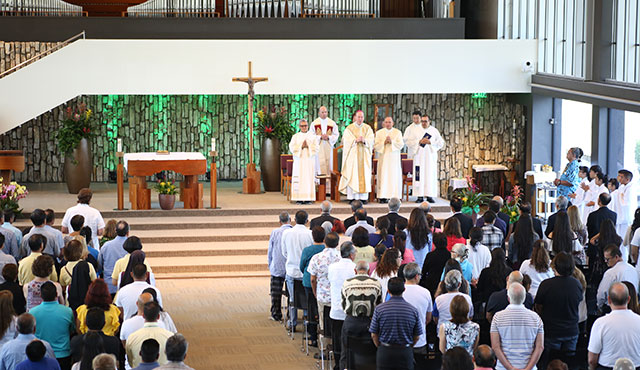Across the globe people are on the move. They are fleeing danger, oppression and privation, as well as seeking safety, freedom and opportunity. From the Middle East and Northern Africa they take to the sea or across the desert to escape. From Central America and Mexico they flock to the United States border in search of asylum.
And wherever refugees and immigrants stop, they often find the Catholic Church offering shelter, aid and even resettlement.
“We’re in the biggest migrant movement since World War II,” Greg Walgenbach, director of Life, Justice and Peace for the Diocese of Orange, said of those displaced by conflict, climate change and other hardships. “We have this massive movement of people.”
As Catholics, he added, the faithful have a duty to help “because we are present and we see the impacts.”
Bishop Timothy Freyer says the Bible guides the moral response.
“In Matthew 25, Jesus speaks of the final judgement when the Son of Man will come and separate the sheep from the goats. The criteria He will use is whether we welcomed the stranger, fed the hungry, clothed the naked, cared for the sick, etc. Based upon this teaching, the Diocese (and especially Catholic Charities) assists immigrants in a variety of ways,” Bishop Freyer says.
According to the UN Refugee Agency, there were 22.5 million refugees and 2.8 million asylum seekers internationally as of the end of 2016.
In 2013, Pope Francis’ first official trip outside Rome was to the Mediterranean island of Lampedusa, near Sicily, where he mourned the drowning of immigrants trying to reach Europe. In an open-air Mass, the pontiff decried the “globalization of indifference” to the plight of desperate migrants.
Closer to home, the immigration dilemma was brought into stark light when 3,000 families were separated at the U.S. border as the current administration launched its “zero tolerance” policy in April.
Walgenbach said when the family separations came to light, “there was a week when I got the most calls I’ve ever received. People were shaken and wanting to help and be involved.”
For immigrants able to make it into the country, Catholic Charities of Orange County is a lifeline.
Created in 1976, shortly after the formation of the Diocese, the Catholic Charities became indispensable for new arrivals. For 40 years, Orange County became a national leader in resettling Vietnamese refugees.
In so doing, the local Catholic charities and the Diocese were at the heart of what would become the U.S. refugee resettlement program of today. In 1980, Congress passed the Refugee Act, which laid out a definition of refugee and policy for resettlement.
Since then, the Catholic Church has helped resettle nearly one-third of all refugees received by the United States. This is according to a June report by the Center for Migration Studies, looking at 1.1 million refugees from more than 30 nations resettled in the United States between 1987 and 2016.
With the soaring cost of living in Orange County and a dwindling population of refugees allowed into the U.S., local Catholic Charities haven’t sponsored a resettlement in years, according to Tita Smith, executive director of Catholic Charities of Orange County.
Instead, it has pivoted to providing immigrant aid, offering more than 40 services, ranging from citizenship courses and applications to assistance with Deferred Action for Childhood Arrivals, or DACA, requests to residency stabilization and remedies.
“We’re busy all day, every day,” Smith said, noting her organization has increased staffing for immigration services from 10 to 24.
According to Smith, Catholic Charities offered 16,853 services to immigrants in the 2017-2018 fiscal year, including more than 3,200 in its citizenship program and more than 500 DACA applications and renewals.
The Church and Diocese have also been active socially and politically in reform efforts over the years. Diocese of Orange Bishop Kevin Vann is in his second three-year term as chair of Catholic Legal Immigration Network, Inc.
In a blog, he called for Catholics to be “a light of reason and dialogue and clarity” in perilous times. Bishop Vann wrote that his Irish ancestors faced prejudicial and xenophobic movements, adding, “In the present day, sadly, those clouds are once more making their presence felt.”
Walgenbach says the Church has consistently reached out to legislators to advocate for immigrants.
“Unfortunately (immigration) has become a partisan issue,” he said of the politics of immigrations. “For the Church it is not a partisan issue.”
Going forward, Bishop Freyer says the Church will continue “advocating for legislative solutions to the broken immigration system we presently have. We are not advocating for ‘open borders,’ but an approach that will recognize our need to care for those coming to America in search of a better life, as well as respecting that a nation has the right to control its borders.”

